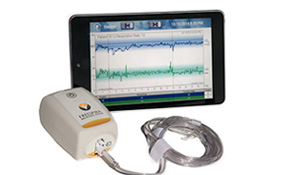 Palo Alto Health Sciences, which has developed a mobile-enabled breathing system for people with panic disorder, raised $1.97 million in the second tranche of a $5 million round. The investment was led by Aphelion Capital with participation from other angel investors. Palo Alto Health Sciences has raised $7.5 million to date.
Palo Alto Health Sciences, which has developed a mobile-enabled breathing system for people with panic disorder, raised $1.97 million in the second tranche of a $5 million round. The investment was led by Aphelion Capital with participation from other angel investors. Palo Alto Health Sciences has raised $7.5 million to date.
The company’s FDA-cleared offering, called the Freespira Breathing System, is designed to help people who have panic disorder, an anxiety disorder. People who have panic disorder experience recurring panic attacks. Palo Alto Health Sciences CEO Debra Reisenthel told MobiHealthNews that the science behind the company’s product is based on research from Stanford University and Boston University in the mid 2000s, which found that people who have panic disorder are chronically over-breathing, not just when they have a panic attack, but all the time.
“People who have this condition, panic disorder, have a physiologic issue,” Reisenthel said. “They use this technology and protocol to test whether or not, if you train people to breathe in a way that is functional, it can help people to breath with a normalized respiratory rate and also increase their level of carbon dioxide. These patients can actually stop having panic attacks and can stop having these symptoms of panic.”
Freespira Breathing System includes a small sensor that syncs with a tablet-based app and measures a user’s breathing rate as well as the amount of carbon dioxide in each exhale. The companion app takes users through a four-week program, under the supervision of their provider, complete with audio and visual-led breathing exercises. Users complete two 17-minute sessions every day.
The primary way the company is marketing Freespira to patients is through their therapist or counselor, Reisenthel said. But patients can also access Freespira without going through a therapist or clinician.
“People are hearing about us all over, so when people come to our website, if they find out about us and they are not seeing a therapist, or they don’t want to, we have the ability to assess and train those patients who would prefer not to see a therapist,” she explained. “There are different ways patients can have access to or be trains but there is an authorization — it’s not a prescription that has to be written — but there is an authorization that the patient is eligible for treatment.”
In August 2015, Palo Alto Health Sciences announced a partnership with Highmark Health and Allegheny Health Network to offer the Freespira Breathing System to members. As part of this partnership, Highmark would pay for the system. And while Reisenthel said she is creating programs like this one with other payers, she also said patients are able to pay for the service out of pocket. The program costs about $499 for the one month of treatment.















